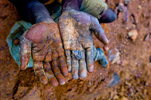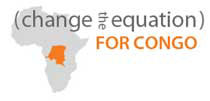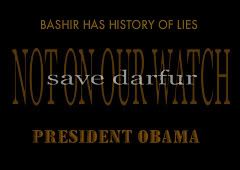Memorial for Manute Bol in Washington on Saturday, after which Manute will be flown to southern Sudan to be buried next to his father.
"I do want to speak about the passing, the untimely passing of a giant, a giant in the heart of the Sudanese people, but also a literal giant. At 7 foot 7 inches tall, Manute Bol was a hero in his native home of Sudan, not for the fact alone that he was a pro basketball player in the United States, or for the fact that he killed a lion with a spear while he was working as a cow herder. Manute Bol was a hero because of his advocacy for his fellow countrymen, and a true, true humanitarian...
'Manute had a gentle nature and an unmistakable humor. He was also a Christian, and his faith guided his advocacy for his fellow Sudanese brothers and sisters. Manute was the son of a Dinka tribal chief, and was given the name Manute, which means special blessing. Manute was indeed special, and what made him special was not his height, but his heart. Manute often returned to Sudan to visit refugee camps, and subsequently created the Ring True Foundation to assist those less fortunate than himself....
"The world needs more Manute Bols, individuals who dedicate their lives for others. Our thoughts and our prayers go out to Manute, his family, his friends and the people of Sudan."
By Dan Steinberg | June 22, 2010; 4:14 PM ET
Categories:
SOME PEOPLE said Manute Bol was 7-6. Most said he was 7-7. All I know is that he was and always will be bigger than life.
The former 76ers center - a renowned freedom fighter for his native Sudan - died of kidney problems and a rare skin disease Saturday in Charlottesville, Va. He was reported to be 47.
And that's part of the magic, the charisma, the lore of the Dinka tribesman. Some of what we know about him is fact, some is legend, stories told through the years. There are times when it's virtually impossible to separate fact from legend, and all you can do is laugh. Which is what Bol always did. He would tell stories, set up pranks, be the subject of pranks, then laugh. Invariably, he would laugh with you.
I was in the old Salt Palace in Salt Lake City when Bol, then a Sixer, stepped in to jump center against Mark Eaton, the Utah Jazz' massive 7-4 center.
"Man, you are big," Eaton said.
"No mon," Bol said in that hard-to-describe twang of his. "You are big. I am just tall."
I was in the Sixers' locker room at Saint Joseph's, then the team's practice site, when Bol giddily picked up a colleague's briefcase and hung it from a water pipe along the ceiling, leaving it several inches out of my colleague's reach. I remember the look of anguish on my colleague's face, then the subsequent sigh of relief when a 6-10 teammate of Bol's stepped out of the shower and volunteered to help.
Jim Lynam, then a rookie head coach with the then-San Diego Clippers, tried to draft Bol in the second round in 1983. Don Feeley, a former coach at Sacred Heart, had been in Sudan working for the U.S. State Department and helping as an assistant with the Sudanese national team and had seen Bol.
"He said they kept telling him about the big guy from the bush," Lynam recalled. "He had never seen him. Then, one day, the door opened and in stepped what he said was 'the biggest guy he ever saw.' ''
The Clippers' management told Lynam they wouldn't "waste" a second-round pick on this guy. Lynam waited until the fifth round. But the NBA wouldn't allow the pick. The executives overseeing the draft had never heard of Manute Bol.
Bol's passport said he was 21, but somebody somewhere came up with information that the age was incorrect. And under Bol's passport photo, it said he was 5-7.
"He said, 'They took my picture when I was sitting down,' '' Lynam recalled.
Bol landed at an English language center at Case Western Reserve in Cleveland, played a year at Division II Bridgeport, spent a season in the United States Basketball League, then finally joined the then-Washington Bullets as a second-round pick in 1985.
"We were afraid for him, with his lack of weight [about 205 pounds]," then-Bullets assistant Fred Carter said. "Instead, he blocked shots with such ferocity that he had an advantage."
Carter also recalled that, because of Bol's height, in most hotel rooms he had to get on his knees to wash his face and brush his teeth. To sleep reasonably comfortably, Bol would place two single beds end-to-end. One year, at the Sixers' training camp in Lancaster, the team ordered a specially sized bed for him.
He bounced to the Golden State Warriors in 1988, then came to the Sixers in '90.
I wanted the first interview with him as a Sixer, and Frank Catapano, his New England-based agent, gave me a phone number in Egypt. My son insists that I located Bol in a hut; I just know that the phone line was scratchy and that Bol was difficult to understand from thousands of miles away. But I got what I wanted.
So what is fact and what is legend?
I have read that Bol was born in a village in a remote part of Sudan, where civil war had left millions dead. His grandfather, Bol Chol, was said to stand 7-10; he was also said to have been a powerful chieftan with 40 wives. Manute's father, Madute, was said to have been 6-8 and had seven wives and a large herd of cattle, a sign of wealth. When Manute joined his first basketball team, he was said to have walked 3 days from his village to take part.
When Manute married his second wife, he was said to have paid 150 cows for her. He reveled in telling NBA teammates and friends about how he had killed a lion with a spear.
"He was a unique guy," said Jeff Ruland, a teammate with the Bullets. "Like me, he had a great sense of humor. But he was also very caring. He would give you the shirt off his back. I got him as a rookie, and one night I took him to see an Arnold Schwarzenegger movie called 'Commando.' The rest of the season, he called me 'Commando.'
"He told me he had killed a lion with a spear, and I said, 'You probably killed it with one of your free throws.' We laughed a lot, but he had a lot of grief in his life, and he did a lot of good for his people."
He was a specialist in the NBA. He didn't have a lot of skill, but he could block and intimidate shots. He averaged five blocks as a rookie and, in the course of his career, once blocked 11 shots in a half, eight in a quarter. In a game against the Orlando Magic, he rejected four successive shots.
And, amazingly, he loved taking threes. He was an astounding 20-for-91 with the Warriors in '88-89, and playing for the Sixers in '92-93 knocked down six of 12 in the second half of a loss to the Phoenix Suns. He finished his career with 1,599 points, 2,647 rebounds and 2,086 blocks.
Bol would donate virtually all of his salary to the rebel movement in Sudan, and to feed the hungry there. He would make personal appearances, then donate his fee. He beat the Chicago Bears' legendary William "Refrigerator" Perry in a celebrity boxing bout. He signed a 1-day contract with a minor league hockey team in Indianapolis, even though he could not skate.
"He was a great person who enjoyed life," said Rick Mahorn, Bol's teammate with the Sixers. "He was proud of his heritage, very confident in his size. He enjoyed being with people who were honest and truthful. When he told me about killing the lion, I told him it must have already been an old, dead lion. But if he took it, he could dish it out as well."
I can remember days at St. Joe's when Charles Barkley or Mahorn would come rushing out of the locker room, a barefoot Bol chasing them, hurling his sneakers at them. I never really knew what went on to precipitate those scenes.
I do know that the first time he stepped into the shower room at St. Joe's, his teammates dubbed him with a nickname that I can't repeat here.
Ruland wondered about Bol's age.
"I always thought he put down a lower number so he could play more years," Ruland said. "For all I know, he could have been 70 when he died."
Mahorn viewed Bol's passing as "a sad moment."
"He was a good player, a good friend," Mahorn said. "And once you were his friend, you were always his friend. That's just how he was. Every moment with him was just fun, but he was a soldier, proud of who he was, trying to help everybody around him."
Source: www.philly.com/dailynews/sports
~~~~~~~~~~~~~~~~~~~~~~~~~~~~~~~~
In early June, six leading Sudanese doctors were arrested by the Sudanese Government's National Security and Intelligence Services (NISS) and detained without charge for their membership in the Doctors' Strike Committee, which has called for improvements in salaries and working conditions.
The violence against the Doctors' Strike Committee members is escalating. Yesterday, another committee member, Dr. Hisham Abdulgani, was reportedly arrested while leaving Khartoum hospital after meeting with several consultants and government officials who had invited him to discuss a peaceful resolution to the dispute. Just today, NISS agents reportedly entered the house of another Committee leader, Dr. WalaEldin Ibrahim, and his wife, mother and children were questioned as to his whereabouts.
In 2003, doctors came together to demand better working conditions from the Government of Sudan. After a brief strike, the government accepted a 12-point agreement with the physician activists, which included a salary increase.
Seven years later, that agreement has yet to be implemented. Doctors formed a new Doctors' Strike Committee in early 2010, and held a series of strikes that ended when the government agreed to implement the agreement in April 2010. However, Sudan's Ministry of Health then withdrew the agreement in mid-May, and the Doctors' Committee called a meeting for June 2, to decide next steps. Before the meeting could be held, several doctors were arrested, one severely beaten.
On June 2, doctors and medical students from the University of Khartoum organized a protest to demand the release of their colleagues. Officers of the NISS attacked the peaceful protesters, badly injuring several of them. During the first week of June, more doctors were arrested, and other members of the Doctors' Strike Committee were forced into hiding. There are reports that some of the doctors have been severely beaten.
Today, the doctors remain on strike until their colleagues are released, and medical students have been assigned to cover hospital duties across Sudan. At least seven doctors are in prison, and are at risk of abuse or torture. Other doctors and their families continue to be threatened.
The Sudanese medical system is in crisis. The Doctors' Strike Committee is negotiating with the Sudanese Government for their colleagues' release.
Your voice can make a difference. Take action today.
Email the Embassy of Sudan and the Sudan Mission to the UN, and call on the Government of Sudan to release the six doctors detained in early June: Dr. Alhadi Bahkeit, Dr. Ahmed Alabwabi, Dr. Ashraf Hammad, Dr. Mahmoud Khairallah, Dr. Abdelaziz Ali Jame, Dr. Ahmed Abdullah KhalafAllah, as well as Dr. Hisham Abdulgani, immediately and unconditionally. And demand the government peacefully resolve talks with the Doctors' Strike Committee so that physicians can return to work and the health of all Sudanese can be promoted and protected.
~~~~~~~~~~~~~~~~~~~~~~~~~~~~~~~~~
Darfur In the News
BBC: Three Rwandan peacekeepers 'killed in Darfur'. The peacekeepers, from Rwanda, came under attack in West Darfur, an official with the joint UN-African Union force told Reuters news agency. Twenty-seven troops from the peacekeeping force known as UNAMID have now died since the UN took joint control in 2008. After a period of relative calm, there has been a recent increase in the number of deaths in Darfur. About 600 people died in fighting in Darfur last month - the highest monthly toll since 2008.
Reuters: Cyprus probes weapons on Sudan-bound ship. Cyprus has intercepted a vessel carrying military equipment thought to be bound for Sudan, under an arms embargo by the United Nations and the European Union. A security source said authorities were investigating whether the cargo contravened a U.N. arms embargo on all armed groups operating in Sudan's Darfur region, the site of a seven-year conflict pitting government troops and allied militias against rebel fighters. Asked about the cargo, Cyprus' Commerce Minister Antonis Paschalides said: "I cannot specify right now what material it is, whether it is tanks, not tanks or other things, but there is definitely military material which comes under export control."
Sudan Tribune: UK earmarks $100 million dollars for Southern Sudan referendum. The United Kingdom has earmarked $100 million US dollars for the conduct of the upcoming referendum in Southern Sudan. The money will be availed through the British International Foreign Development organization that will be based in Juba. Last week the US allocated sixty million dollars to assist in the process of the upcoming referendum in Southern Sudan. Ambassador Kay stressed the importance of making the referendum a success, adding that it was to avoid repeating mistakes committed during the recent elections. Vice President Machar had earlier stressed the importance of revealing specific assistance budgets by international community partners so that the government prepares accordingly.
Reuters: Prosecutor probes Swedish link in Sudan crimes. Sweden's public prosecutor opened a criminal investigation on Monday into allegations that Swedes working for a consortium of oil companies during the Sudanese civil war may have been complicit in human rights abuses. The consortium -- made up of Lundin Oil, Malaysian firm Petronas, Austrian energy group OMV and a Sudanese state-owned firm -- signed a deal in 1997 with Sudan's government to exploit oil in disputed areas, European Coalition in Oil in Sudan (ECOS) wrote. The start of exploration set off a vicious war as the government sought to take control of oil fields in the area, leading to thousands of deaths and the forced displacement of local populations, ECOS wrote in its report.
































